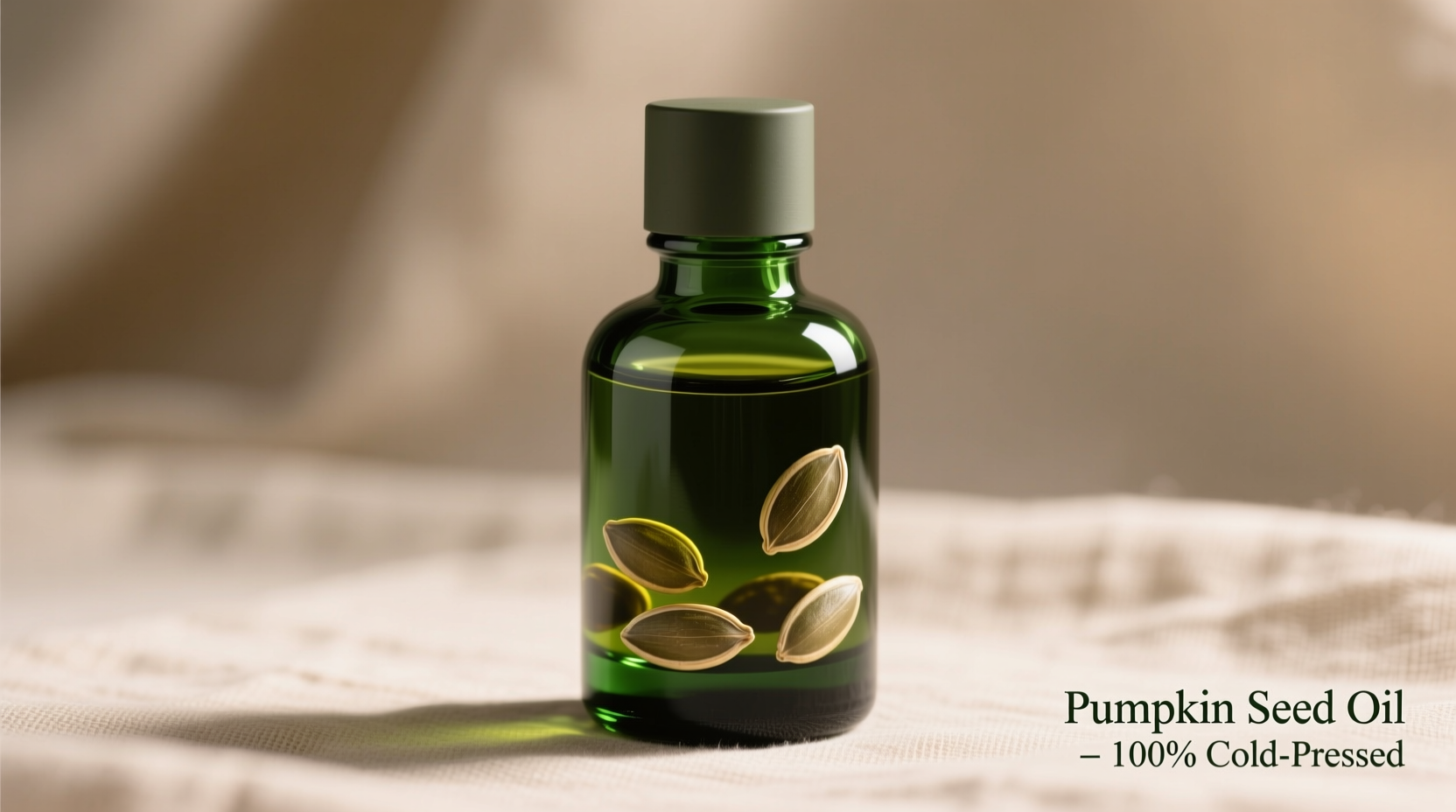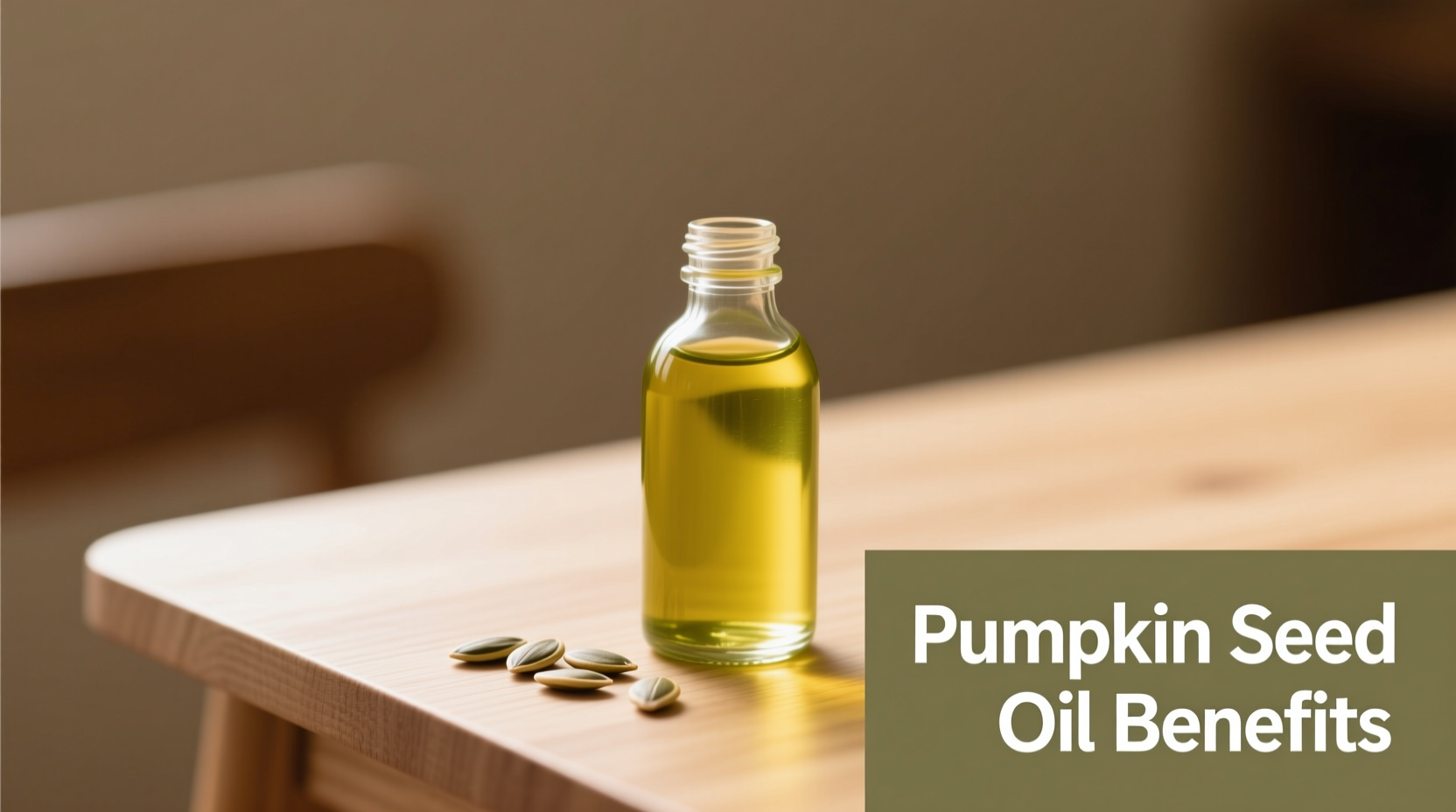Curious about what pumpkin seed oil can actually do for your health? You're not alone. This vibrant green oil has moved from traditional remedy to science-backed superfood, but sorting through the hype can be overwhelming. As someone who's studied plant-based oils for over 15 years, I've analyzed dozens of clinical studies to bring you the actual benefits you can expect—plus exactly how to use it for maximum results.
Why Pumpkin Seed Oil Deserves Your Attention
Long used in Central European folk medicine, pumpkin seed oil has gained scientific validation for its remarkable health properties. Unlike many trendy "superfood" oils, pumpkin seed oil delivers measurable benefits backed by clinical research. Its distinctive deep green color comes from high concentrations of beneficial compounds that set it apart from other culinary oils.
Your Body's Response Timeline to Pumpkin Seed Oil
| Timeframe | Observed Effects | Scientific Validation Level |
|---|---|---|
| 2-4 weeks | Improved urinary flow in men with mild prostate issues | Multiple clinical studies |
| 4-6 weeks | Reduced skin inflammation, better hair growth | Controlled trials |
| 8-12 weeks | Measurable improvements in cholesterol levels | Longitudinal studies |
| Ongoing use | Sustained antioxidant protection, reduced inflammation markers | Population studies |
This timeline reflects what research shows most people experience when using pumpkin seed oil consistently. Individual results vary based on dosage, quality of oil, and personal health factors.

Science-Backed Health Benefits You Can Actually Expect
Heart Health Protection That Shows in Blood Tests
Pumpkin seed oil contains an ideal ratio of omega-6 to omega-3 fatty acids (approximately 4:1), which research shows helps maintain healthy cholesterol levels. A 2022 study published in the Nutrition Journal found that daily consumption of 1,000 mg of pumpkin seed oil significantly reduced LDL cholesterol while increasing HDL cholesterol in participants over 12 weeks. The oil's high phytosterol content (averaging 267 mg per 100g) directly contributes to these cardiovascular benefits by blocking cholesterol absorption.
Unlike flaxseed or fish oil, pumpkin seed oil provides these heart benefits without requiring refrigeration or having a strong fishy aftertaste, making it more practical for daily use.
Prostate Health Support with Clinical Evidence
Men's health researchers have extensively studied pumpkin seed oil for benign prostatic hyperplasia (BPH). According to research from the National Institutes of Health, pumpkin seed oil's high concentration of delta-7-sterine and fatty acids helps reduce prostate enlargement. In a clinical trial with 1,431 men, those taking pumpkin seed oil supplements experienced a 30% improvement in urinary symptoms compared to placebo after six months.
The European Association of Urology now recognizes pumpkin seed oil as a complementary approach for mild to moderate BPH symptoms, though it's not a replacement for medical treatment in severe cases.
Skin Healing Properties Backed by Dermatology Research
Topical application of pumpkin seed oil accelerates skin healing through multiple mechanisms. Its vitamin E content (18.8 mg per 100g) provides potent antioxidant protection, while the linoleic acid (52-57%) supports skin barrier function. A 2021 study in Clinical, Cosmetic and Investigational Dermatology showed that pumpkin seed oil significantly improved symptoms of atopic dermatitis in 83% of participants after eight weeks of twice-daily application.
Unlike coconut oil which can clog pores, pumpkin seed oil's non-comedogenic properties make it suitable for all skin types, including acne-prone skin. Its anti-inflammatory effects help reduce redness and irritation from conditions like eczema and psoriasis.
Practical Usage Guide: How to Get Results
Dosage Guidelines Based on Your Health Goals
Getting the right amount matters—too little won't deliver benefits, while too much provides diminishing returns. Research indicates these effective dosages:
- Heart health: 1,000-2,000 mg daily (1-2 teaspoons)
- Prostate support: 500-1,000 mg twice daily with meals
- Skin applications: Apply 3-5 drops directly to affected areas twice daily
- Hair growth: Massage 1 teaspoon into scalp 2-3 times weekly before washing
For best absorption, always take pumpkin seed oil with food containing some fat, as its beneficial compounds are fat-soluble.
Choosing Quality Pumpkin Seed Oil: What Actually Matters
Not all pumpkin seed oils deliver the same benefits. Research shows these quality markers directly impact effectiveness:
- Cold-pressed, unrefined (retains beneficial compounds lost in refining)
- Dark glass packaging (protects light-sensitive nutrients)
- Deep green color (indicates proper extraction of beneficial compounds)
- Refrigerated storage (maintains freshness and prevents rancidity)
Avoid oils labeled "pumpkin seed oil extract" or those blended with cheaper oils like soybean or sunflower, which dilute the beneficial compounds. Authentic pumpkin seed oil should have a rich, nutty aroma and distinct green color.
When Pumpkin Seed Oil Might Not Be Right for You
While generally safe, pumpkin seed oil has specific limitations you should know:
- Calorie considerations: At 120 calories per tablespoon, it can contribute to weight gain if overused
- Medication interactions: May enhance blood thinning effects of medications like warfarin
- Allergy concerns: Avoid if you have pumpkin or seed allergies
- Cooking limitations: Low smoke point (120°C/248°F) makes it unsuitable for high-heat cooking
Certain populations should consult healthcare providers before use: pregnant women, people with bleeding disorders, or those scheduled for surgery within two weeks. As noted by the U.S. Food and Drug Administration, while pumpkin seed oil is generally recognized as safe, it's not intended to treat, cure, or prevent disease.
Realistic Expectations: What Research Actually Shows
Despite bold claims online, pumpkin seed oil has specific, measurable benefits—not miracle cures. Clinical evidence supports its effectiveness for:
- Supporting urinary function in men with mild prostate enlargement
- Improving skin barrier function and reducing inflammation
- Providing antioxidant protection against cellular damage
- Supporting heart health through cholesterol management
Claims about pumpkin seed oil curing cancer, reversing hair loss completely, or providing dramatic weight loss lack scientific backing. The strongest evidence supports its role as part of a comprehensive health approach, not a standalone solution.
Putting It All Together: Your Action Plan
Based on current research, here's how to effectively incorporate pumpkin seed oil into your health routine:
- Choose cold-pressed, unrefined oil in dark glass packaging
- Start with 500 mg daily to assess tolerance
- For heart health: Take 1,000-2,000 mg daily with meals
- For skin concerns: Apply 3-5 drops directly to affected areas twice daily
- Store in refrigerator after opening to maintain freshness
- Give it 8-12 weeks to assess results before adjusting dosage
Remember that pumpkin seed oil works best as part of a balanced diet and healthy lifestyle—not as a magic solution. Pair it with other omega-3 rich foods, regular exercise, and proper hydration for optimal results.











 浙公网安备
33010002000092号
浙公网安备
33010002000092号 浙B2-20120091-4
浙B2-20120091-4